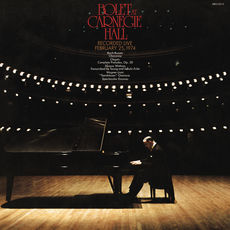A conflicting destiny
The career path of the great Cuban pianist (1914-1990) was rather unusual and did not follow the conventional path for a musician of this calibre. Jorge Bolet, a committed interpreter if not specialist in Franz Liszt’s music, began a career very early on as a concert performer and teacher as soon as he finished his studies in Philadelphia and in Europe (Vienna and Paris), where he was taught by Josef Hofmann, Leopold Godowski and Moriz Rosenthal. Between 1939 and 1942, he was the assistant of the great Rudolf Serkin at the Curtis Institute in Philadelphia. During the war, he pursued a diplomatic career as an attaché at the Cuban Embassy in the United States. He became an American citizen and taught at prestigious universities including Indiana University in Bloomington, before succeeding Serkin in 1977. It was at this point that he was discovered in Europe for his new recordings for DECCA dedicated to Franz Liszt, a strange twist of fate for a man who had already been recording albums for 25 years but who had mainly dedicated himself to the teaching profession.
Jorge Bolet is known for playing on Baldwin and Bechstein pianos which he insisted upon or took with him to each of his concerts and recordings. He began this new career when he was well into his sixties, with his old-fashioned moustache, his impeccable sense of style and his exquisite, albeit rather old-fashioned manners, he emerged in a world where the the great legendary pianists, Wilhelm Kempff, Arthur Rubinstein, Vladimir Horowitz, Claudio Arrau and Emil Gilels, were gradually disappearing.
A breakthrough recital
His recital from February 25, 1974 at Carnegie Hall, available on QOBUZ, is legendary. It was the evening that marked the beginning of his second career that would last 16 years. From Bach-Busoni to Liszt’s revised Tannhäuser: Overture, the complete collection of Chopin Preludes and many others, the atmosphere is electrifying.
Thanks to signing a contract with DECCA, Jorge Bolet was able to record many works by his favourite composer, Liszt. He first became hooked on Liszt in his youth through one of his masters, Emil von Sauer, who was himself taught by the Hungarian composer. His remarkable take on Années de Pèlerinage exemplifies his masterful, poetic playing and smooth, rich tone. In his recording of the Etudes D’Exécution Transcendante, he doesn’t fall into the trap of rushing, as he never did, rather, he focuses on the spirit of the piece and its subtle delicacies. He loved Liszt’s many opera transcriptions and paraphrases which he played enthusiastically and which have a joyful feel to them.
A calmer tempo
At the end of his life, Jorge Bolet chose mostly to play at tempos that were generally slower and more mellow than usual, bringing out the Lisztian melody but at the same time adding his own shades of emotion. At 70 years of age the nimble pianist was still producing some of the finest music, and his recordings show not only how Liszt was influenced by the romanticism that was around before him, but also that his harmonies and playing style, which were a result of his brilliant composing, would eventually guide piano music to the fluidity of Ravel and Debussy.
When he recorded the original soundtrack for Charles Vidor’s 1960 film, Le Bal des adieux (Song Without End), with Dirk Bogarde playing Liszt and Capucine as Princess Carolyne Wittgenstein, Jorge Bolet critics accused him of being too much of a virtuoso. The film still received an Oscar for best music, but the reception of the Cuban pianist is somewhat of a stark contrast to the reception at the end of his career.
Create a free account to keep reading










